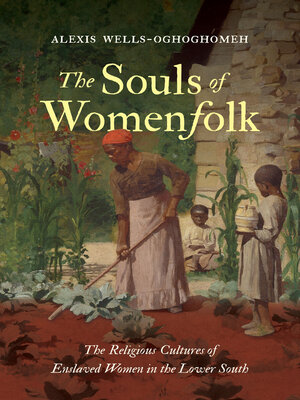The Souls of Womenfolk
ebook ∣ The Religious Cultures of Enslaved Women in the Lower South
By Alexis Wells-Oghoghomeh

Sign up to save your library
With an OverDrive account, you can save your favorite libraries for at-a-glance information about availability. Find out more about OverDrive accounts.
Find this title in Libby, the library reading app by OverDrive.



Search for a digital library with this title
Title found at these libraries:
| Library Name | Distance |
|---|---|
| Loading... |
Beginning on the shores of West Africa in the sixteenth century and ending in the U.S. Lower South on the eve of the Civil War, Alexis Wells-Oghoghomeh traces a bold history of the interior lives of bondwomen as they carved out an existence for themselves and their families amid the horrors of American slavery. With particular attention to maternity, sex, and other gendered aspects of women’s lives, she documents how bondwomen crafted female-centered cultures that shaped the religious consciousness and practices of entire enslaved communities. Indeed, gender as well as race co-constituted the Black religious subject, she argues—requiring a shift away from understandings of “slave religion” as a gender-amorphous category.
Women responded on many levels—ethically, ritually, and communally—to southern slavery. Drawing on a wide range of sources, Wells-Oghoghomeh shows how they remembered, reconfigured, and innovated beliefs and practices circulating between Africa and the Americas. In this way, she redresses the exclusion of enslaved women from the American religious narrative. Challenging conventional institutional histories, this book opens a rare window onto the spiritual strivings of one of the most remarkable and elusive groups in the American experience.
Women responded on many levels—ethically, ritually, and communally—to southern slavery. Drawing on a wide range of sources, Wells-Oghoghomeh shows how they remembered, reconfigured, and innovated beliefs and practices circulating between Africa and the Americas. In this way, she redresses the exclusion of enslaved women from the American religious narrative. Challenging conventional institutional histories, this book opens a rare window onto the spiritual strivings of one of the most remarkable and elusive groups in the American experience.







